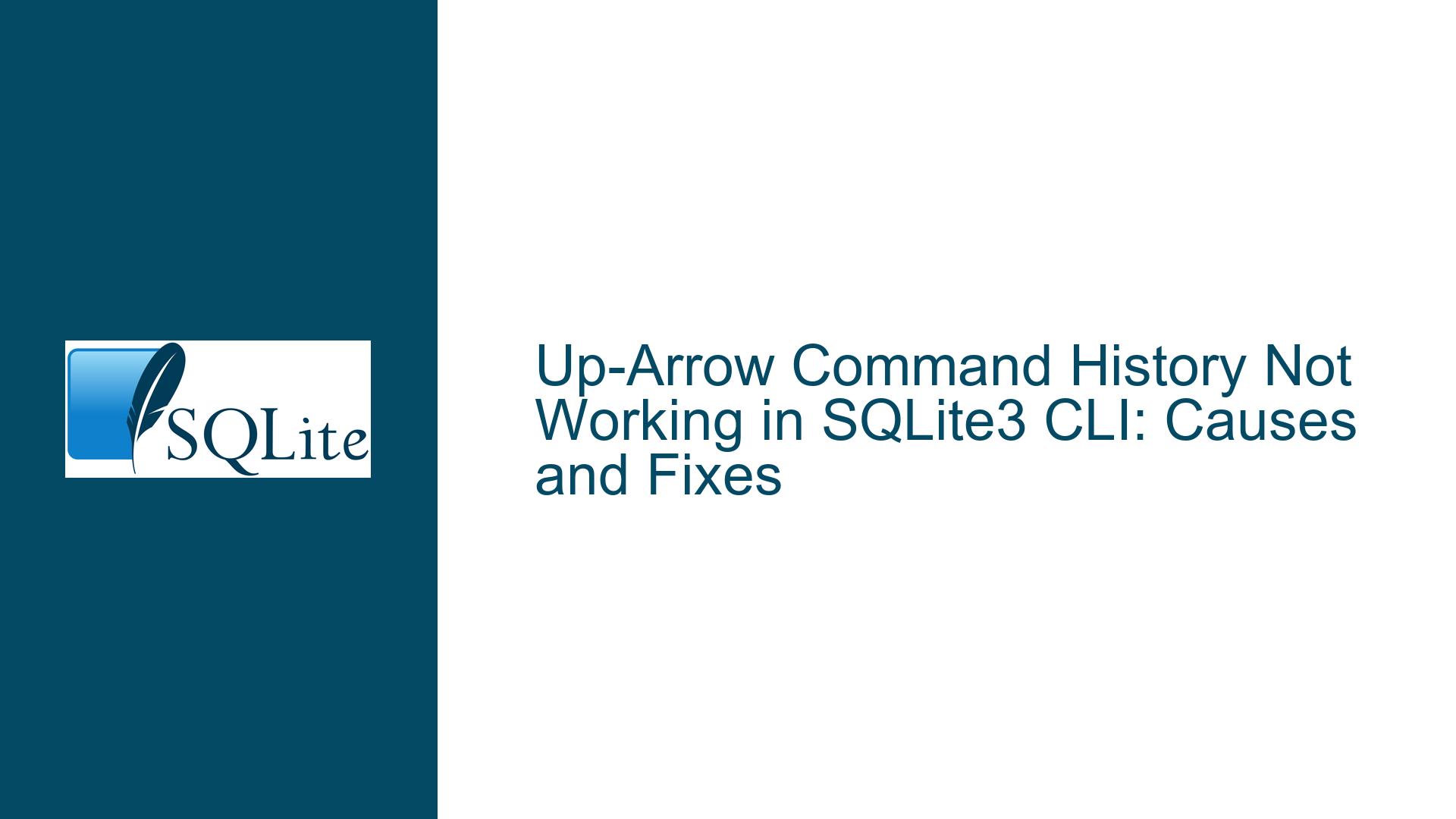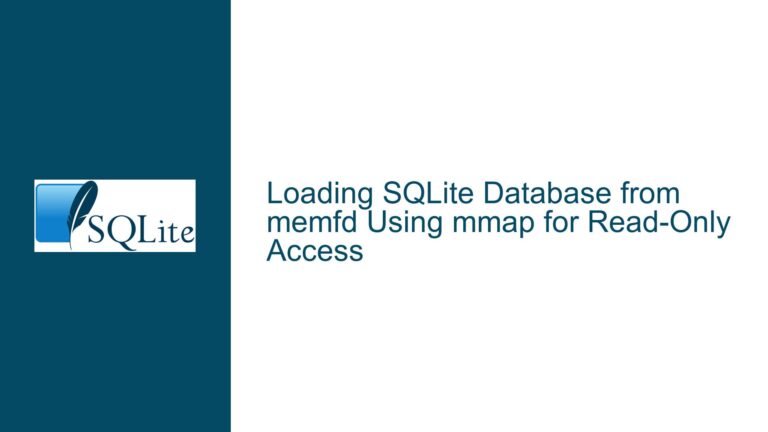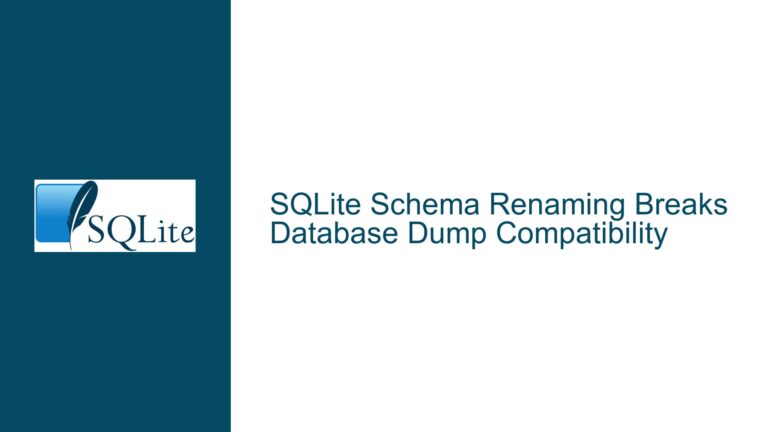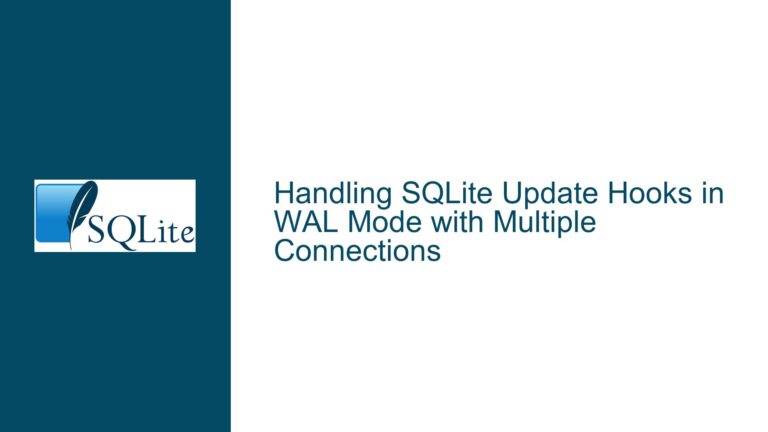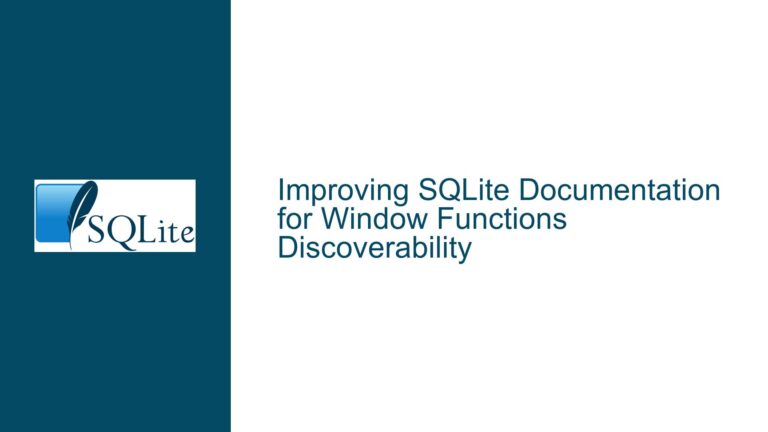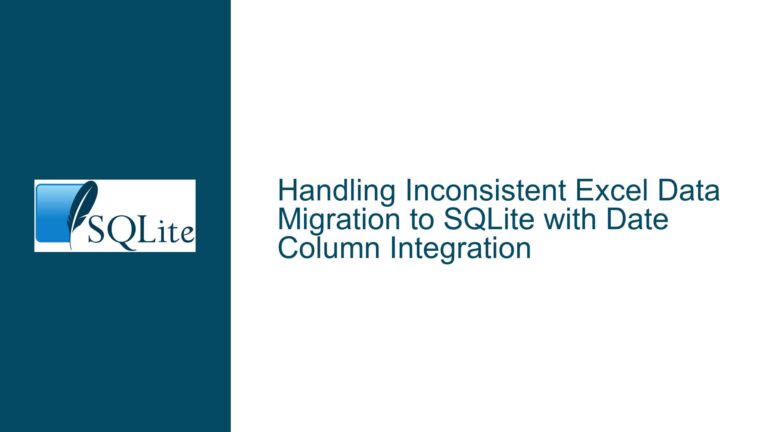Up-Arrow Command History Not Working in SQLite3 CLI: Causes and Fixes
Missing Line Editing Support in SQLite3 Shell Across Operating Systems
Issue Overview
The SQLite3 command-line interface (CLI) provides interactive features such as command history navigation using the up/down arrow keys. However, this functionality behaves inconsistently across operating systems. On Windows, the sqlite3.exe shell typically supports arrow-key history due to integration with the cmd.exe terminal. On Unix-like systems (Linux, macOS), this feature depends on whether the SQLite3 shell was compiled with a line-editing library such as Readline or Linenoise. Users on Linux systems, particularly those with minimal installations (e.g., Ubuntu Server), often encounter a non-functional up-arrow key, resulting in escape sequences (e.g., ^[[A) appearing instead of recalling previous commands. This discrepancy arises from differences in how terminal input is handled and the availability of development libraries during compilation.
The core problem revolves around three factors:
- Library Dependencies: The SQLite3 shell requires external libraries for advanced line editing. On Unix-like systems, it defaults to Readline if available, but this requires both the runtime library and development headers (
libreadline-devon Debian/Ubuntu). - Compilation Configuration: The build process for SQLite3 auto-detects Readline unless explicitly disabled. However, missing development packages or misconfigured build flags can result in a shell compiled without line-editing support.
- Installation Permissions: Even when dependencies are resolved, installation errors (e.g.,
Permission deniedwhen writing to/usr/lib/pkgconfig) can prevent successful deployment of the modified SQLite3 binary.
This issue is particularly prevalent in environments where SQLite3 is compiled from source without attention to terminal interaction libraries or where system packages omit Readline for size constraints. Understanding these layers is critical to diagnosing and resolving the problem.
Root Causes of Line Editing Failures in SQLite3
Missing Readline Development Packages
The SQLite3 build system relies on the presence of Readline’s development headers (readline.h,history.h) and linker libraries (libreadline.so,libncurses.so). On many Linux distributions, the baselibreadlinepackage provides runtime support, but compiling software against it requires thelibreadline-dev(or equivalent) package. Without these headers, theconfigurescript silently disables Readline support, falling back to a minimal input handler that lacks history navigation.Incorrect Build Flags or Library Paths
While the SQLite3configurescript auto-detects Readline in standard locations (/usr/include,/usr/local/include), custom installations or non-standard library paths (e.g., Readline installed via Homebrew on macOS) may require explicit flags:./configure CFLAGS="-I/opt/local/include" LDFLAGS="-L/opt/local/lib"Failure to specify these paths can lead to false negatives during configuration checks, resulting in a shell binary without line editing.
Use of Linenoise Instead of Readline
As an alternative to Readline, SQLite3 supports Linenoise, a lightweight line-editing library. However, Linenoise is not enabled by default. To use it, the build must explicitly include the library:./configure --linenoise=/path/to/linenoise.cMisconfigured Linenoise paths or version incompatibilities (e.g., using a fork with Windows-specific patches on Linux) can cause silent failures.
Permission Errors During Installation
Compiling SQLite3 with--prefix=/usrattempts to install the binary and supporting files into system directories. Withoutsudoprivileges,make installfails withPermission deniederrors when writing to/usr/lib/pkgconfigor/usr/bin. This halts the installation process, leaving the system’s default SQLite3 binary unchanged.Terminal Environment Misconfiguration
In rare cases, the terminal emulator itself (e.g.,gnome-terminal,xterm) may not correctly handle ANSI escape sequences for arrow keys. This is more common in legacy environments or when using non-POSIX shells.Static vs. Dynamic Linking Conflicts
If SQLite3 is statically linked against a line-editing library but the system’s dynamic linker cannot resolve dependencies at runtime (e.g., due toLD_LIBRARY_PATHmisconfiguration), the shell may start without history support or crash with linker errors.
Resolving Line Editing and Installation Issues in SQLite3
Step 1: Install Required Development Packages
On Debian/Ubuntu systems, install Readline and NCurses development packages:
sudo apt update && sudo apt install libreadline-dev ncurses-dev
For Red Hat/CentOS:
sudo yum install readline-devel ncurses-devel
On macOS with Homebrew:
brew install readline
Step 2: Reconfigure and Rebuild SQLite3 with Readline Support
Download the SQLite source code or use the amalgamation bundle. Run the configure script with verbose output to verify Readline detection:
./configure --prefix=/usr --enable-readline --enable-editline
make clean && make
Check the configuration summary for:
Line-editing support for the sqlite3 shell: readline
If Readline is not detected, manually specify include/library paths:
export C_INCLUDE_PATH=/usr/include/readline
./configure --prefix=/usr --with-readline-inc=/usr/include/readline --with-readline-lib=/usr/lib/x86_64-linux-gnu
Step 3: Install the Rebuilt Binary with Correct Permissions
Avoid permission errors by either:
- Installing to a user-writable directory:
./configure --prefix=$HOME/.local && make installAdd
$HOME/.local/binto yourPATH. - Using
sudofor system-wide installation:sudo make install
Step 4: Validate Line Editing Functionality
Launch the SQLite3 shell and press the up arrow. If escape sequences appear (e.g., ^[[A), verify linking:
ldd $(which sqlite3) | grep readline
Output should include libreadline.so. If not, recheck build steps.
Step 5: Fallback to Linenoise or rlwrap
If Readline remains problematic, compile with Linenoise:
wget https://raw.githubusercontent.com/antirez/linenoise/master/linenoise.c
wget https://raw.githubusercontent.com/antirez/linenoise/master/linenoise.h
./configure --linenoise=$(pwd) && make
Alternatively, use rlwrap as a wrapper:
sudo apt install rlwrap
rlwrap sqlite3
Step 6: Diagnose Terminal Compatibility
Test the terminal’s handling of arrow keys with:
showkey -a
Press the up arrow. Expected output:
^[[A 27 0033 0x1b
91 0133 0x5b
65 0101 0x41
If incorrect, reconfigure the terminal emulator or shell (bash, zsh) to ensure POSIX compliance.
Step 7: Address Static Linking Issues
For statically linked builds, ensure all dependencies are included:
./configure --prefix=/usr --enable-static --disable-shared
Verify with:
file sqlite3
Output should include statically linked.
Step 8: Update System Alternatives (Linux Only)
After installing to /usr/local/bin, override the system SQLite3 binary:
sudo update-alternatives --install /usr/bin/sqlite3 sqlite3 /usr/local/bin/sqlite3 100
By methodically addressing library dependencies, build configurations, and installation permissions, users can enable robust line-editing features in SQLite3 across all major operating systems. For persistent issues, leveraging lightweight alternatives like Linenoise or rlwrap provides a pragmatic workaround without deep system modifications.
